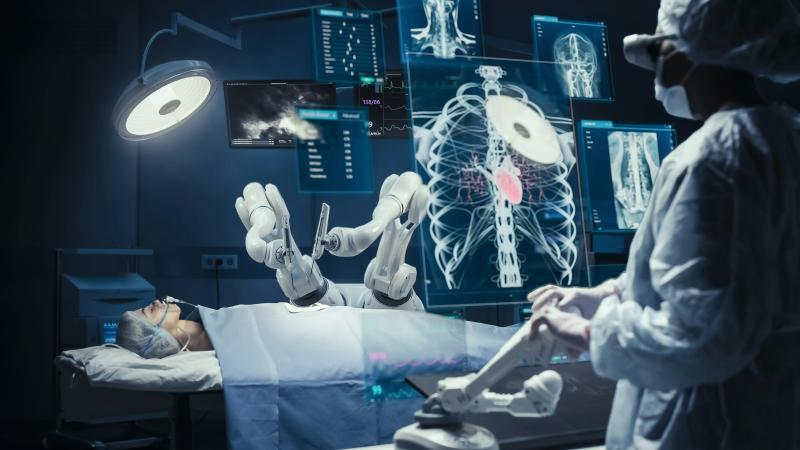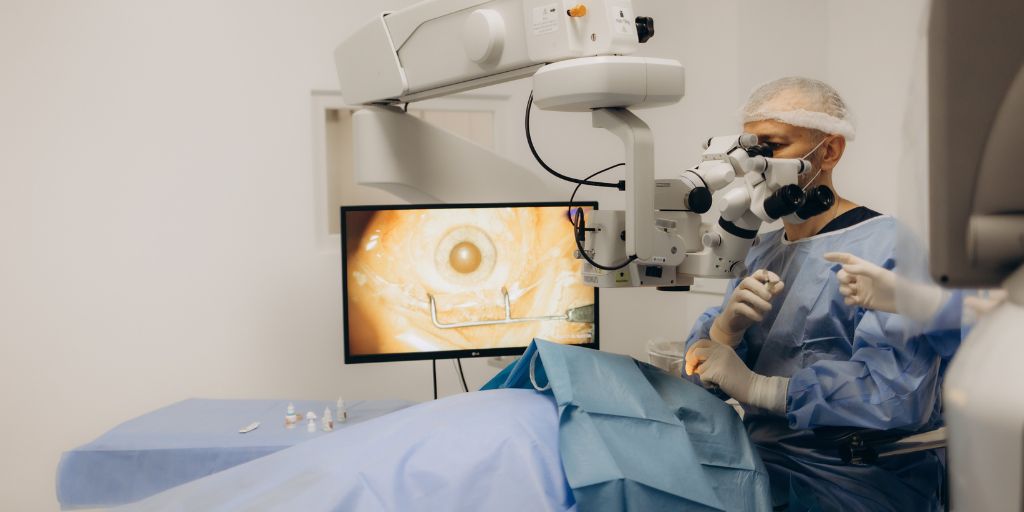Artificial intelligence (AI) is transforming every industry it impacts—and healthcare is no exception. By the year 2035, the integration of artificial intelligence in healthcare with medicine will have altered the ways in which we diagnose, treat, and manage illnesses.
With advancements such as robotic surgeries, AI-driven diagnostics, precision medicine, and automated administrative processes, the future holds the promise of a highly efficient, personalized, and accessible global healthcare system.
How AI Will Transform Healthcare By 2035?

This blog delves into the ways AI is set to revolutionize healthcare by 2035, analyzing technological advancements, societal impacts, ethical considerations, and practical uses throughout the healthcare landscape.
The Current State of AI in Healthcare
As of 2025, AI has already made significant strides in the healthcare sector. Machine learning algorithms are aiding in medical imaging, predictive analytics are enhancing hospital readmission predictions, and chatbots are handling basic patient inquiries. These implementations are merely the beginning.
Related Article: How Might AI Transform Healthcare In The Next 10 Years?
AI platforms such as IBM Watson Health, DeepMind Health, and PathAI are redefining pathology, oncology, and clinical decision-making. Nevertheless, the majority of these implementations are still in pilot stages or confined to technologically advanced institutions. Challenges such as scalability, regulatory approval, and building trust continue to pose significant obstacles.
AI-Driven Diagnostics: Surpassing Human Precision

By the year 2035, artificial intelligence is expected to exceed human clinicians in both speed and precision across various diagnostic fields. AI technologies will:
For instance, forthcoming AI systems, trained on vast datasets comprising hundreds of millions of medical records and imaging scans, will highlight anomalies that even the most adept professionals might overlook.
Real-World Impact by 2035
Instantaneous Diagnoses: AI will deliver immediate results for the majority of blood tests and imaging scans.
Digital Twins: Each patient could possess a digital counterpart that is continuously updated with real-time information to model and predict health outcomes.
You Must Also Read: How Is Artificial Intelligence (AI) Transforming Industries Like Healthcare, Finance, And Entertainment?
Global Accessibility: AI-enhanced diagnostic applications on smartphones will render medical evaluations available in remote and underserved regions.
AI and Predictive Analytics in Preventive Healthcare
Preventive medicine is set to transition from a reactive approach to a proactive one through the use of predictive AI. By scrutinizing trends in patient data, wearable technology, and environmental factors, AI can anticipate potential illnesses well before they manifest.
Instances of Predictive AI Implementation:
Shift in Work, Purpose, and Society
Bill Gates’ forecasts extend beyond mere technological advancements; they also necessitate a reevaluation of societal norms. He proposes that as artificial intelligence assumes an increasing number of responsibilities, the conventional understanding of work must be reimagined.
With AI enhancing productivity and automating both routine and intricate tasks, Gates foresees a future characterized by shorter workweeks, earlier retirements, and an abundance of leisure time. He has even introduced the concept of a 'post-labour world,' where employment ceases to be the primary organizing principle of existence.
Jobs are an artefact of the shortage. it’s hard to reprogramme your brain to imagine a future without that," Gates remarked, indicating that societies will need to redefine notions of purpose and productivity in a world of post-scarcity.
Gates recognizes that this shift is both thrilling and disconcerting. He observes that while AI could usher in a state of 'deflationary abundance'—where goods and services become significantly more affordable—there are also potential dangers of economic upheaval, job loss, and heightened inequality if the benefits are not equitably distributed. Gates has championed policies such as universal basic income, reduced working hours, and innovative frameworks for wealth distribution to tackle these issues.
What Jobs Will Survive—and What Will Change?
In spite of his ambitious predictions, Gates does not contend that AI will supplant every human endeavor. He emphasizes that positions requiring creativity, emotional intelligence, intricate problem-solving, and authentic human interaction—such as therapists, artists, and caregivers—are likely to persist, at least in the near term. Additionally, fields like coding, energy, and biology are highlighted as areas where human expertise will continue to hold significance, although even these sectors will undergo transformation due to AI.
Gates also cautions about the risks linked to the swift adoption of AI, such as misinformation, bias, and the accumulation of power within a small number of large technology firms. He urges young innovators to guide AI development towards human-centered approaches and views open-source AI and international collaboration as means to democratize its advantages.
Read Also : What date will the next full moon occur?
Artificial intelligence (AI) is transforming every industry it impacts—and healthcare is no exception. By the year 2035, the integration of artificial intelligence in healthcare with medicine will have altered the ways in which we diagnose, treat, and manage illnesses.
With advancements such as robotic surgeries, AI-driven diagnostics, precision medicine, and automated administrative processes, the future holds the promise of a highly efficient, personalized, and accessible global healthcare system.
How AI Will Transform Healthcare By 2035?
This blog delves into the ways AI is set to revolutionize healthcare by 2035, analyzing technological advancements, societal impacts, ethical considerations, and practical uses throughout the healthcare landscape.
The Current State of AI in Healthcare
As of 2025, AI has already made significant strides in the healthcare sector. Machine learning algorithms are aiding in medical imaging, predictive analytics are enhancing hospital readmission predictions, and chatbots are handling basic patient inquiries. These implementations are merely the beginning.
Related Article: How Might AI Transform Healthcare In The Next 10 Years?
AI platforms such as IBM Watson Health, DeepMind Health, and PathAI are redefining pathology, oncology, and clinical decision-making. Nevertheless, the majority of these implementations are still in pilot stages or confined to technologically advanced institutions. Challenges such as scalability, regulatory approval, and building trust continue to pose significant obstacles.
AI-Driven Diagnostics: Surpassing Human Precision
By the year 2035, artificial intelligence is expected to exceed human clinicians in both speed and precision across various diagnostic fields. AI technologies will:
For instance, forthcoming AI systems, trained on vast datasets comprising hundreds of millions of medical records and imaging scans, will highlight anomalies that even the most adept professionals might overlook.
Real-World Impact by 2035
Instantaneous Diagnoses: AI will deliver immediate results for the majority of blood tests and imaging scans.
Digital Twins: Each patient could possess a digital counterpart that is continuously updated with real-time information to model and predict health outcomes.
You Must Also Read: How Is Artificial Intelligence (AI) Transforming Industries Like Healthcare, Finance, And Entertainment?
Global Accessibility: AI-enhanced diagnostic applications on smartphones will render medical evaluations available in remote and underserved regions.
AI and Predictive Analytics in Preventive Healthcare
Preventive medicine is set to transition from a reactive approach to a proactive one through the use of predictive AI. By scrutinizing trends in patient data, wearable technology, and environmental factors, AI can anticipate potential illnesses well before they manifest.
Instances of Predictive AI Implementation:
Shift in Work, Purpose, and Society
Bill Gates’ forecasts extend beyond mere technological advancements; they also necessitate a reevaluation of societal norms. He proposes that as artificial intelligence assumes an increasing number of responsibilities, the conventional understanding of work must be reimagined.
With AI enhancing productivity and automating both routine and intricate tasks, Gates foresees a future characterized by shorter workweeks, earlier retirements, and an abundance of leisure time. He has even introduced the concept of a 'post-labour world,' where employment ceases to be the primary organizing principle of existence.
Jobs are an artefact of the shortage. it’s hard to reprogramme your brain to imagine a future without that," Gates remarked, indicating that societies will need to redefine notions of purpose and productivity in a world of post-scarcity.
Gates recognizes that this shift is both thrilling and disconcerting. He observes that while AI could usher in a state of 'deflationary abundance'—where goods and services become significantly more affordable—there are also potential dangers of economic upheaval, job loss, and heightened inequality if the benefits are not equitably distributed. Gates has championed policies such as universal basic income, reduced working hours, and innovative frameworks for wealth distribution to tackle these issues.
What Jobs Will Survive—and What Will Change?
In spite of his ambitious predictions, Gates does not contend that AI will supplant every human endeavor. He emphasizes that positions requiring creativity, emotional intelligence, intricate problem-solving, and authentic human interaction—such as therapists, artists, and caregivers—are likely to persist, at least in the near term. Additionally, fields like coding, energy, and biology are highlighted as areas where human expertise will continue to hold significance, although even these sectors will undergo transformation due to AI.
Gates also cautions about the risks linked to the swift adoption of AI, such as misinformation, bias, and the accumulation of power within a small number of large technology firms. He urges young innovators to guide AI development towards human-centered approaches and views open-source AI and international collaboration as means to democratize its advantages.
Read Also : What date will the next full moon occur?